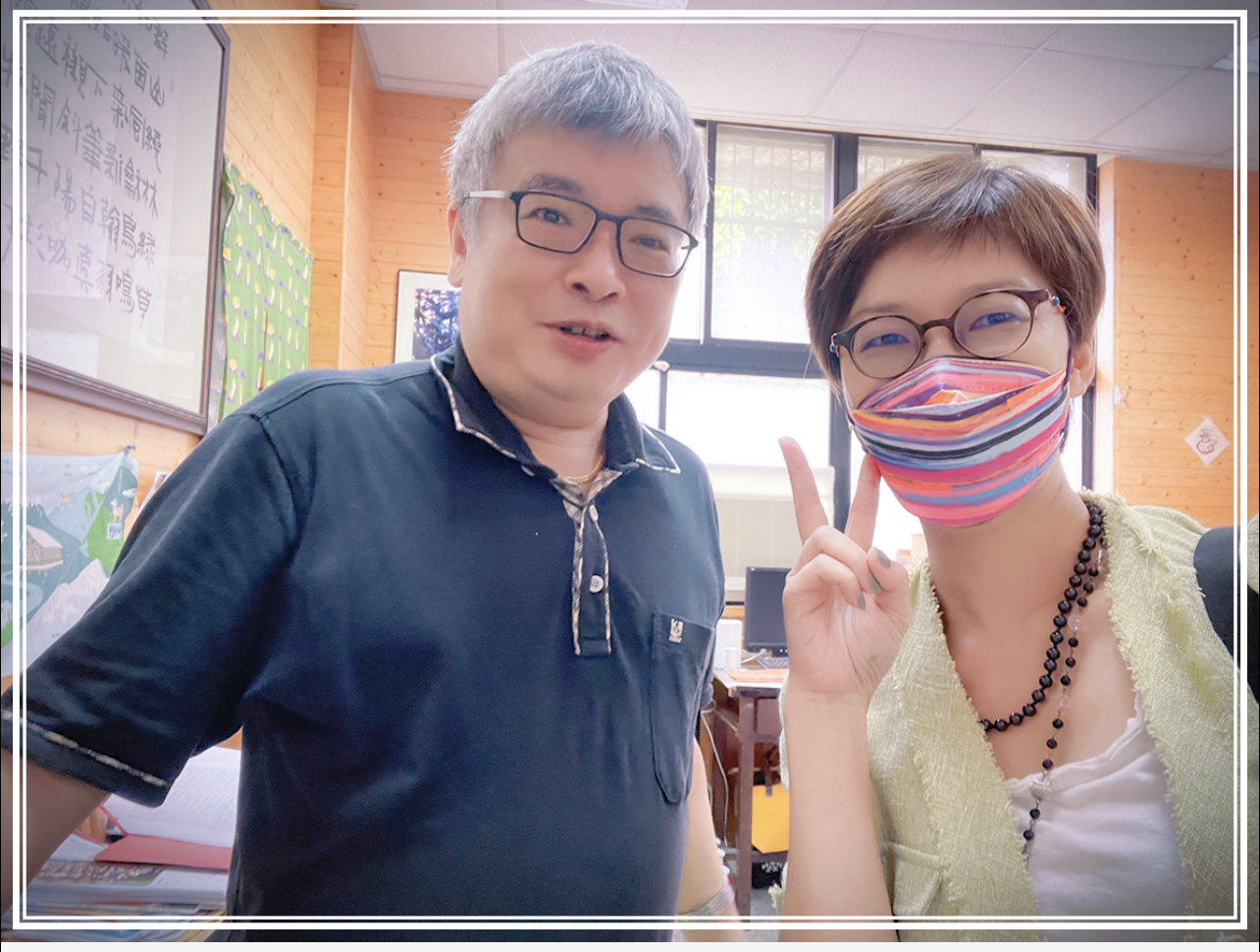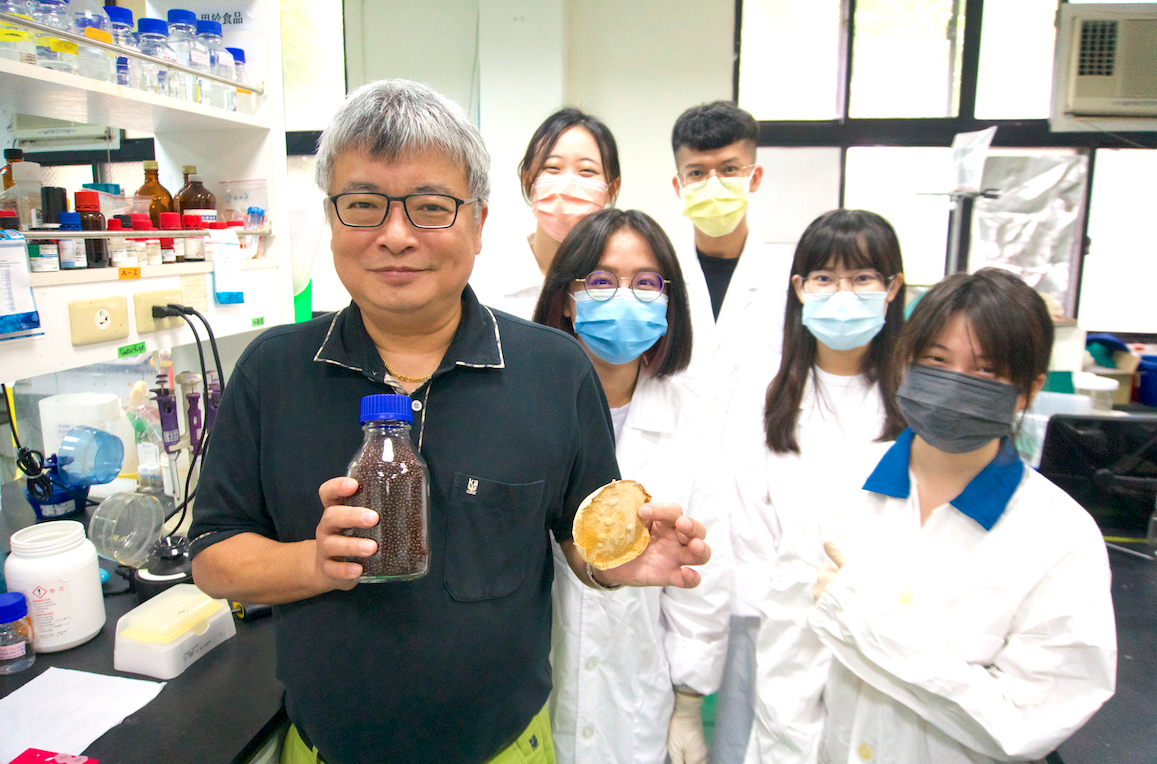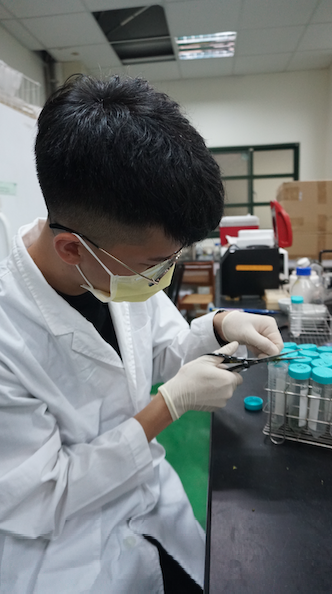Director’s Notebook
Dean Sheng-Yang asked me, “Hey Pei-Lin, do you think aspirin is Western medicine or herbal medicine?”
I first met Dean Sheng-Yang around four years ago. At the time, I knew that he was a widely respected academic. Through our meeting this time, I found out that he had a deep understanding of forestry, sustainability, essential oils, and aromatherapy. But best yet, he exuded a certain charm because of his ability to keep things fun and interesting while illuminating concepts with science and statistics. While interviewing Dean Sheng-Yang, I was able to experience the heartfelt emotion of Aerospace Industrial Corporation’s former CEO when he said, “I spent lots of time with Dean Sheng-Yang, which influenced and shaped me on many levels. The feeling I had around Sheng-Yang was extremely special and incredibly rich.”

Picture 1: Taking a Picture with Dean Sheng-Yang in his lab AKA “Totoro’s Den” (Photo Courtesy of Pei-Lin Lin)
Sheng-Yang Wang AKA “Professor Totoro” who is Also Famous for Being “Mr. Other-Centered”
While interviewing Dean Sheng-Yang, who has graced the covers of many publications as “Professor Totoro,” I felt that he was different than many other distinguished professors and big names in the academic world. His blunt mannerisms and straight talk felt oddly like talking to a super-intelligent mob boss at times.
Dean Sheng-Yang’s unpolished responses were in stark contrast to many other people that I’ve interviewed. He is the first person who has ever just come out and said, “It sounds kind of cringy, but everyone is just trying to improve their own lot in life and garner some level of professional recognition. In my case, I’m really focused on going after recognition.”
.jpeg)
Picture 2: Dean Shen-Yang AKA Professor Totoro Showing Off His Teaching Style (Photo Courtesy of Dean Sheng-Yang)
Is chasing after professional recognition the only way to receive the respect and admiration of others? In the pursuit of this, is it also possible to be as warm and friendly as Totoro?
Dean Sheng-Yang has been working at National Chung Hsing University (NCHU) for 18 years. Thinking back on his time as a student, he didn’t go into medicine or electrical engineering. On the contrary, he chose to pursue a degree in forestry, which was an unpopular field at the time. He added with a laugh that he went into forestry because his grades back then weren’t good enough to do much else! Therefore, he was determined to make his mark in any way that he could. In 2007, he got his first administrative position at NCHU, which was the Director of the Huisun Experimental Forest Station. At the time, the operational rights of the Forest Station were at risk of being transferred to another entity due to poor performance. However, during Sheng-Yang’s second year on the job, the Huisun Experimental Forest Station did more than just get out of the red, it became a profitable venture. Thanks to Sheng-Yang, his colleagues all received performance bonuses. Later, when he became the Dean of NCHU’s International College of Innovation and Industry Liaison, he helped his colleagues take home the highest performance bonuses out of any department in the school three years in a row.
It's clear through his actions that Dean Sheng-Yang’s “recognition” hasn’t come from “self-interest,” but rather being “other-interested.” Dean Sheng-Yang smiled when he said, “My motivation at work as always come from a concern that other people will say that my work sucks! I want people to have good things to say about me, so my attitude towards work is to always give my all to whatever is on my plate.”
COVID Inhibiting Taiwanofungus Camphoratus Seen as Taiwan’s National Treasure and Elixir of Life
Since Dean Sheng-Yang is “other-interested,” he’s poured his heart and soul into his forestry work. His research has brought him in contact with plants from Cinnamomum Osmophloeum and Citrus Depressa to Pelargonium Hortorum and Taiwanofungus Camphoratus. When the global pandemic broke out, Dean Sheng-Yang’s thoughts turned to forests and how they could alleviate the suffering of the most amount of people.
Dean Sheng-Yang got really excited when he said, “Recently, I used NMR spectroscopy to observe the process of feeding Taiwanofungus Camphoratus to a cell after it had been infected with the spike protein from SARS-CoV-2. I discovered that Antcin B, one of the components of Taiwanofungus Camphoratus, inhibited the reproduction of the virus. This builds on previous discoveries regarding Taiwanofungus camphoratus, namely that it can limit inflammation and block ACE2 from entering cells.” Thanks to Dean Sheng-Yang, we now know the key component of Taiwanofungus Camphoratus inhibits the reproduction of SARS-CoV-2.
Dean Sheng-Yang then circled back to his first question, “Is aspirin Western medicine or herbal medicine?” He smiled and said that the salicylic acid in aspirin was first isolated from tree bark, so if you want to get technical, aspirin is really herbal medicine. He then asked me if I’d ever heard of the “American Elixirs of Life.” Medically, they’re actually called “steroids.” Dean Sheng-Yang said that a main component of Taiwanofungus Camphoratus is a compound that is very similar in structure to steroids. However, taking Taiwanofungus Camphoratus has the added benefit of both not inducing side effects, such as moon face or buffalo hump, and acting as a powerful anti-inflammatory. It’s also possible that it can suppress the inflammatory response of SARS-CoV-2, which triggers a flurry of activity in the immune system. In the future, Taiwan’s endemic Taiwanofungus Camphoratus just may very well become the “Taiwanese Elixir of Life.”

Picture 3: Dean Sheng-Yang Taking a Picture with a Team of Researchers While Holding a Fruiting Taiwanofungus Camphoratus and Dripping Pills
International Talent Going to New Southbound Overseas Science and Technology Innovation Centers to Conduct Exchanges with the Vietnamese Academy of Agricultural Science
Taiwanofungus Camphoratus is endemic only to Taiwan. Therefore, Dean Sheng-Yang, with the support of the Ministry of Science and Technology and NCHU, not only conducted standardization and normalization procedures but also obtained the approval of the Ministry of Health and Welfare to bring Taiwanofungus Camphoratus to Vietnam.
This part of the story starts with a cutting-edge international research project called I-RiCE. At the time, NCHU and UC Davis collaborated to bring Taiwanese and US agricultural technology to Vietnam and Thailand. In addition to Dean Sheng-Yang, the program also included other top agricultural talents such as Professor Shyi-Dong Yeh, whose nickname “papaya leaf” comes from curing diseases that impact various fruits, and NCHU Vice President Jenn-Wen Huang, who is well-known for developing solutions to soilborne plant diseases. Subsequently, the New Southbound Policy took over the I-RiCE project after it ended and formed a bilateral cooperative partnership with the Vietnamese Academy of Agricultural Science (VAAS). In addition, the Overseas Agricultural Science and Technology Innovation Center was established at VAAS’ headquarters in Hanoi. This center helped integrate the strengths found in Taiwan’s agricultural biotechnology industry, which includes biofertilizers, biopesticides, disease control, functional foods, and other cutting-edge agricultural technology. Such collaborative efforts have done more than just bringing the agricultural sector into Vietnam. They have also become a vehicle for strengthening agricultural biotechnology throughout Southeast Asia.
.jpeg)
Picture 4: NCHU President Fuh-Sheng Shieu Leads a Team of Researchers to Conduct Exchanges in Vietnam (Courtesy of Dean Sheng-Yang)
Dean Sheng-Yang also mentioned that Professor Wu-Nan Chang, a NCHU colleague who spent 20 years in Vietnam, acted as a conduit for NCHU to bring three outstanding businesses to Hanoi, Vietnam to hold symposiums and directly interface with Vietnamese businesses. On the Taiwanese side, businesses included Maxluck Biotechnology Corporation, known as the godfather of Taiwanese biotech companies, TCI Group, which was once the highest valued Taiwanese biotech stock, and Taiwan Leader Biotech Corporation, which conducts in-depth research into Taiwanofungus Camphoratus. Through the collaborative power of the public sector, research institutions, academia, and business, Taiwan introduced its products into Vietnam and took advantage of the opportunity to gain access to international markets.
Despite His Multiple Identities and Various Titles, Dean Sheng-Yang’s True Passion is Being a “Chemist of Nature”
While talking to Dean Sheng-Yang, I couldn’t help but think back on an interview I had with a researcher who studies marine life. The researcher said that in the future, humanity might have to look towards chemical and biomedical studies of marine life to discover cures for the complex diseases of today. So naturally, I asked Dean Sheng-Yang whether or not these answers might also lie in the world’s forests.
Dean Sheng-Yang smiled and said, “Forests are even more essential! But it goes beyond forests and into agriculture and botany. I specialize in researching the main components, and conducting bioassays, of natural entities found in the fields I just mentioned.” Reflecting on the journey that got him here, Dean Sheng-Yang said that through experiments that supported former NCHU President Jei-Fu Shaw’s research, he was able to confirm the exceptional anti-inflammatory nature of Taiwanofungus Camphoratus. They also proved that higher concentrations of Antrocamphin A, a substance found in Taiwanofungus Camphoratus, correlated with stronger anti-inflammatory curative properties.

Picture 5: Researchers Conducting Extraction and Bioassay Experiments on Taiwanofungus Camphoratus (Photo Courtesy of Pei-Lin Lin)
Dean Sheng-Yang has many jobs which include being a distinguished professor at NCHU and the principal investigator of many national projects. Despite this, he made sure to show that his real passion lies in research by ending the interview with this statement, “No matter whether a researcher is a dean, or even the president of a university, you can never ever turn your back on your field. Even though I have many other administrative titles, the title that I love the most is “Chemist of Nature.”
Through a lifetime of research, Dean Sheng-Yang has without a doubt achieved the recognition in Taiwan he was going after as a young man. However, thanks to the New Southbound Policy, Dean Sheng-Yang’s accomplishments and contributions have now reverberated out of Taiwan and into other countries around the world.
Columnist
.png) Pei-lin Lin
Pei-lin Lin
Pei-lin Lin obtained her B.A. in Philosophy from Fu Jen University and her M.A in Political Science from National Taiwan University. Lin embodies a humanistic literacy and political sensibility. In recent years, Lin has collaborated with the Taiwanese government to shoot videos promoting various policies. Currently, Lin splits her time between running a Chan Lands Ltd., Zongdipan, making documentary films and hosting the podcast “Human Translation Machine.” In the past, Lin has been a reporter for several media outlets and the anchor of shows on TVBS, CBC and Da Ai Television. While at Da Ai Television, Lin’s piece “Muhammad Yunus- Savior of the Poor,” was nominated at the First Taiwan Golden Wheel Awards for Outstanding Television News Feature.